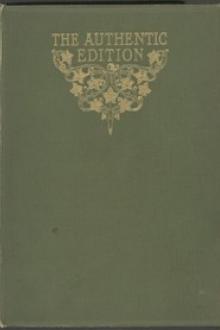The Clicking of Cuthbert by P. G. Wodehouse (acx book reading TXT) 📗

- Author: P. G. Wodehouse
Book online «The Clicking of Cuthbert by P. G. Wodehouse (acx book reading TXT) 📗». Author P. G. Wodehouse
Golf, however, is a curious game—a game of fluctuations. One might have supposed that Mitchell, in such a frame of mind, would have continued to come to grief. But at the beginning of the second nine he once more found his form. A perfect drive put him in position to reach the tenth green with an iron-shot, and, though the ball was several yards from the hole, he laid it dead with his approach-putt and holed his second for a bogey four. Alexander could only achieve a five, so that they were all square again.
The eleventh, the subject of Mitchell's recent criticism, is certainly a tricky hole, and it is true that a slice does land the player in grave difficulties. Today, however, both men kept their drives straight, and found no difficulty in securing fours.
"A little more of this," said Mitchell, beaming, "and the Greens Committee will have to give up piracy and go back to work."
The twelfth is a long, dog-leg hole, bogey five. Alexander plugged steadily round the bend, holing out in six, and Mitchell, whose second shot had landed him in some long grass, was obliged to use his niblick. He contrived, however, to halve the hole with a nicely-judged mashie-shot to the edge of the green.
Alexander won the thirteenth. It is a three hundred and sixty yard hole, free from bunkers. It took Alexander three strokes to reach the green, but his third laid the ball dead; while Mitchell, who was on in two, required three putts.
"That reminds me," said Alexander, chattily, "of a story I heard. Friend calls out to a beginner, 'How are you getting on, old man?' and the beginner says, 'Splendidly. I just made three perfect putts on the last green!'"
Mitchell did not appear amused. I watched his face anxiously. He had made no remark, but the missed putt which would have saved the hole had been very short, and I feared the worst. There was a brooding look in his eye as we walked to the fourteenth tee.
There are few more picturesque spots in the whole of the countryside than the neighbourhood of the fourteenth tee. It is a sight to charm the nature-lover's heart.
But, if golf has a defect, it is that it prevents a man being a whole-hearted lover of nature. Where the layman sees waving grass and romantic tangles of undergrowth, your golfer beholds nothing but a nasty patch of rough from which he must divert his ball. The cry of the birds, wheeling against the sky, is to the golfer merely something that may put him off his putt. As a spectator, I am fond of the ravine at the bottom of the slope. It pleases the eye. But, as a golfer, I have frequently found it the very devil.
The last hole had given Alexander the honour again. He drove even more deliberately than before. For quite half a minute he stood over his ball, pawing at it with his driving-iron like a cat investigating a tortoise. Finally he despatched it to one of the few safe spots on the hillside. The drive from this tee has to be carefully calculated, for, if it be too straight, it will catch the slope and roll down into the ravine.
Mitchell addressed his ball. He swung up, and then, from immediately behind him came a sudden sharp crunching sound. I looked quickly in the direction whence it came. Mitchell's caddie, with a glassy look in his eyes, was gnawing a large apple. And even as I breathed a silent prayer, down came the driver, and the ball, with a terrible slice on it, hit the side of the hill and bounded into the ravine.
There was a pause—a pause in which the world stood still. Mitchell dropped his club and turned. His face was working horribly.
"Mitchell!" I cried. "My boy! Reflect! Be calm!"
"Calm! What's the use of being calm when people are chewing apples in thousands all round you? What is this, anyway—a golf match or a pleasant day's outing for the children of the poor? Apples! Go on, my boy, take another bite. Take several. Enjoy yourself! Never mind if it seems to cause me a fleeting annoyance. Go on with your lunch! You probably had a light breakfast, eh, and are feeling a little peckish, yes? If you will wait here, I will run to the clubhouse and get you a sandwich and a bottle of ginger-ale. Make yourself quite at home, you lovable little fellow! Sit down and have a good time!"
I turned the pages of Professor Rollitt's book feverishly. I could not find a passage that had been marked in blue pencil to meet this emergency. I selected one at random.
"Mitchell," I said, "one moment. How much time he gains who does not look to see what his neighbour says or does, but only at what he does himself, to make it just and holy."
"Well, look what I've done myself! I'm somewhere down at the bottom of that dashed ravine, and it'll take me a dozen strokes to get out. Do you call that just and holy? Here, give me that book for a moment!"
He snatched the little volume out of my hands. For an instant he looked at it with a curious expression of loathing, then he placed it gently on the ground and jumped on it a few times. Then he hit it with his driver. Finally, as if feeling that the time for half measures had passed, he took a little run and kicked it strongly into the long grass.
He turned to Alexander, who had been an impassive spectator of the scene.
"I'm through!" he said. "I concede the match. Good-bye. You'll find me in the bay!"
"Going swimming?"
"No. Drowning myself."
A gentle smile broke out over my old friend's usually grave face. He patted Mitchell's shoulder affectionately.
"Don't do that, my boy," he said. "I was hoping you would stick around the office awhile as treasurer of the company."
Mitchell tottered. He grasped my arm for support. Everything was very still. Nothing broke the stillness but the humming of the bees, the murmur of the distant wavelets, and the sound of Mitchell's caddie going on with his apple.
"What!" cried Mitchell.
"The position," said Alexander, "will be falling vacant very shortly, as no doubt you know. It is yours, if you care to accept it."
"You mean—you mean—you're going





Comments (0)